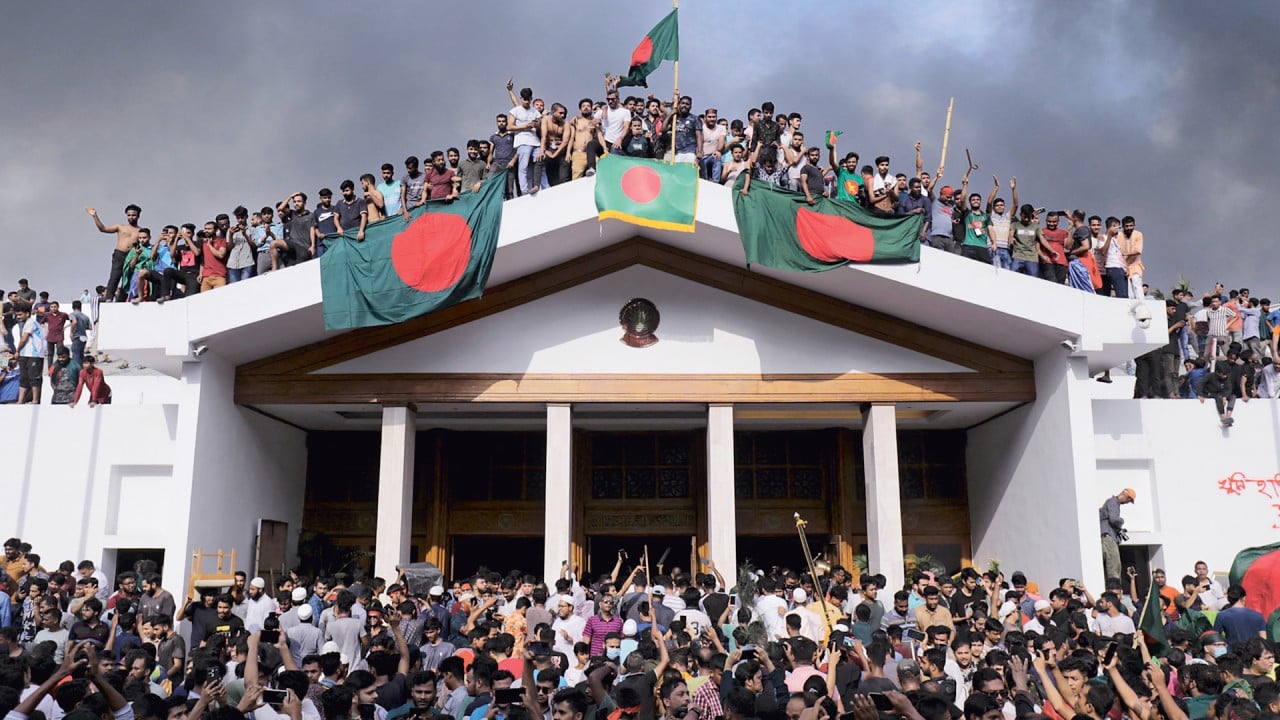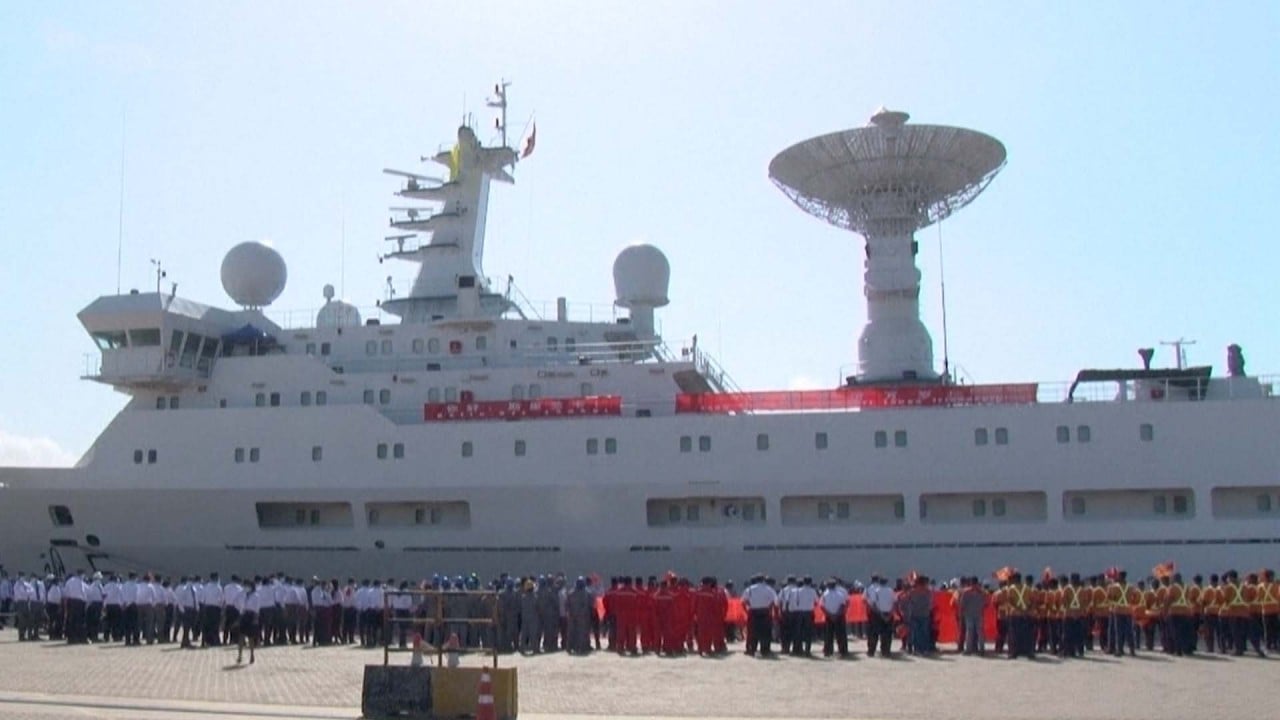“Bangladesh is now going through a reform process that will take a significant amount of time to conclude before elections can take place, so the interim government will need India’s support.”
India’s “Neighbourhood First” foreign policy initiative, launched by Prime Minister Narendra Modi in 2014, aims to strengthen ties with regional countries in South Asia.
Bangladesh’s main opposition parties, the Bangladesh Nationalist Party and the Jamaat-e-Islami, have traditionally favoured closer ties with China and Pakistan over India.
China’s influence in Bangladesh has been particularly strong in defence cooperation. In May, the People’s Liberation Army said it would conduct a joint military exercise with the Bangladesh Armed Forces, while from 2019 to 2023 Bangladesh was the second-largest recipient of Chinese arms exports after Pakistan with 11 per cent, according to official data.
The situation in Bangladesh adds to a series of setbacks for India in its regional diplomacy.
In the Maldives, President Mohamed Muizzu, who campaigned on an anti-India platform, expelled Indian troops managing an aircraft – gifted by Delhi to Malé – and has forged stronger ties with China.
In Nepal, K.P. Sharma Oli, who is considered to have a pro-China stance and previously clashed with India over territorial disputes, has returned as prime minister. India’s relationship with Afghanistan has also been strained since the Taliban retook power in 2021.
Samaranayake said despite these challenges, India’s relations with other smaller South Asian countries were not entirely bleak.
“Bhutan continues to be the most aligned with India. While many have criticised the Maldives’ policy to end the hosting of foreign military presence and build its internal capacity for defence operations, the new government was willing to accept a civilian presence by India in a revised aerial security cooperation programme,” she said.
Samaranayake noted that Sri Lanka, like other smaller South Asian countries, confronted an asymmetry of power with India and often found itself on the weaker end of the equation.
“For example, despite its preference to host as many ships as possible at its ports and generate revenue, Sri Lanka was willing to impose a 12-month moratorium on visiting research vessels due to India’s concern about visits by Chinese ships,” she said.
“Sri Lanka’s presidential election in September represents the next wild card for India’s Neighbourhood First interests. A possible victory by the leftist NPP [National People’s Power alliance] would bring considerable uncertainty about its foreign policy orientation towards India, China, and the United States.”
According to the State of Southeast Asia 2024 survey published by Singapore’s ISEAS – Yusof Ishak Institute, India is one of the least strategically relevant partners to the Association of Southeast Asian Nations while China was seen as the region’s most influential economic, political and strategic power.
Of the 1,994 respondents from 10 Southeast Asian countries who took part in the survey from January to February, only 0.6 per cent said India was the most influential economic power in Southeast Asia, in a list led by China with 59.5 per cent.
Natasha Agarwal, an independent research economist based in India, argued that Delhi’s approach to its neighbours had been marked by arrogance, especially in its interactions with rising global powers like China. She suggested that India might need to adjust its Neighbourhood First policy to accommodate China’s presence in the region.
“Given the economic influence of India and China, independently and collectively, maybe it is time for India to redefine its Neighbourhood First policy,” she said.

‘Win-win partnership’
While India’s neighbourhood policy had run into a bit of bad weather given the recent upheaval in Bangladesh, “things are always dynamic, they are likely to change and improve with time”, said Professor Sreeradha Datta from Jindal School of International Affairs at OP Jindal Global University.
Datta urged Delhi to continue to prioritise its national interests to maintain good relationships in the region.
“India has not lost sight of the neighbouring [Neighbourhood First] policy, which it will always uphold under whatever circumstances, even during the difficult phases India has to see how best it can work with the neighbours,” she said, adding that Delhi should still remain aware of the challenges China could bring even during good times.
Former diplomat Anil Trigunayat said the Neighbourhood First policy was non-reciprocal in terms of its content and application, aiming at the growth, development and capacity building of India’s neighbours.
“India believes that a strong neighbourhood is in our interest. The only expectation for India is that its territories will not be used for anti-Indian security projects like cross border militancy and terrorism. It has been a win-win partnership,” he said.
Trigunayat, who previously served as first secretary in Bangladesh from 1986 to 1990, said bilateral ties with Dhaka were based on people-to-people, historic and cultural connection and any blips would be temporary.
“In the short-run, there might be some setbacks due to the preconceived notions among the current and possibly the next leadership in Bangladesh which usually entertained negative stance towards India,” he said.

Scott Lucas, a professor emeritus at the University of Birmingham, emphasised that India’s regional position ultimately depended on its own stability and progress.
“Despite changes outside, provided India has a stable government and a country that is continuing to progress politically, socially and economically, then as the region changes your finest opportunities will come back,” Lucas said.
Michael Kugelman, director of the Wilson Centre’s South Asia Institute, said regional countries were still keen to work with India because of economic and trade imperatives.
“If you look around the region, even with China’s increasing influence and presence, you still have governments that are keen to at least balance their relations with China and India, and in many cases work closely with India,” Kugelman said.
He cited the case of the Maldives, which had in recent months adopted a more accommodating stance towards Delhi’s concerns, and over the weekend welcomed a visit from India’s Foreign Minister S Jaishankar to “deepen” bilateral ties.
Kugelman said while developments in Bangladesh could still pose significant geopolitical challenges for India, practical considerations, such as trade and water security, would eventually lead to a workable relationship between the two.



